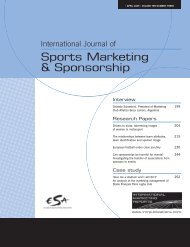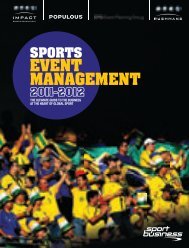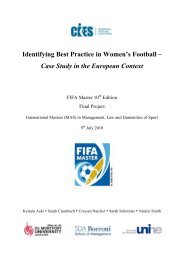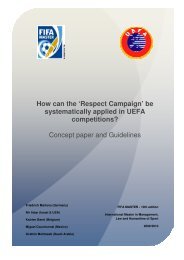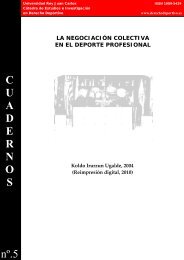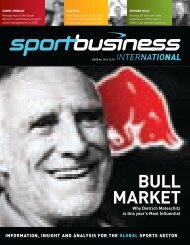01 cover sbi 152.indd - FIFA/CIES International University Network
01 cover sbi 152.indd - FIFA/CIES International University Network
01 cover sbi 152.indd - FIFA/CIES International University Network
You also want an ePaper? Increase the reach of your titles
YUMPU automatically turns print PDFs into web optimized ePapers that Google loves.
INTERNATIONAL FOCUS<br />
MIDDLE EAST<br />
STRATEGY BEHIND THE SPEND<br />
Matthew Glendinning looks at the broader economic and strategic aims behind<br />
the spectacular event hosting success of the Gulf states.<br />
THE SPORTS INDUSTRY may occasionally<br />
feel like it rules the universe, especially when<br />
bankers are having a bad day. But the sheer scale<br />
of the global tourism industry puts even the<br />
sports sector in the shade.<br />
The United Nations states that sport accounts<br />
for as much as three per cent of global economic<br />
activity. Impressive enough, but the UN’s World<br />
Tourism Organisation estimates that tourism<br />
makes up 10 per cent of world GDP.<br />
Small wonder that the new country or city<br />
entrants to sports event hosting in the Middle<br />
East see the promotion of tourism as a major<br />
part of their brief.<br />
At the tourism industry trade show ‘World<br />
Travel Market’, staged at London’s Excel<br />
Centre in November, those UN numbers were<br />
supported by the thousands [50,000 attended in<br />
2008] of delegates swarming the eye-catching<br />
exhibition stands.<br />
In the Middle East section, a falconer in<br />
traditional Arab dress held out a hooded bird on<br />
a gloved arm to intrigue passers-by in front of<br />
the Egypt stand. The Abu Dhabi desk next door,<br />
staffed, admittedly, by three London girls in<br />
flowing golden robes, was located in front of an<br />
artificial waterfall.<br />
On the first floor of Abu Dhabi’s mobile<br />
exhibition unit - the one with the waterfall -<br />
SportBusiness caught up with Ahmed Hussein,<br />
who heads up sports and events marketing for<br />
the Abu Dhabi Tourism Authority (ADTA).<br />
It had been a good few weeks for the<br />
marketer. Yas Island, the $40 billion leisure and<br />
entertainment development containing the Yas<br />
Marina F1 track, had just been selected as the<br />
‘World’s Leading Tourism Development Project’<br />
by the World Travel Awards, the so-called travel<br />
industry ‘Oscars’.<br />
Yas Marina itself had won rave reviews for the<br />
inaugural Abu Dhabi Grand Prix, not least from<br />
Bernie Ecclestone who hailed the track as the<br />
best ever. “What they’ve done is unbelievable,”<br />
said F1’s impresario.<br />
In a month when the UK government<br />
baulked at a request of £5 million funding for<br />
the England 2<strong>01</strong>8 <strong>FIFA</strong> World Cup bid, the<br />
Emirate’s spending of a minimum $400m on<br />
Yas Marina seems from another world.<br />
But there are sound strategic reasons for the<br />
outlay, Hussein explains. “A world-class event<br />
like the F1 Grand Prix was always top of our wish<br />
list and with the right timing and hard work we<br />
have been able to make it happen, “he said.<br />
“The [F1] strategy comes from the<br />
government, which always backs initiatives for<br />
cultural heritage, economic diversity and so on.<br />
“Awareness [of Abu Dhabi] is one of the<br />
priorities and although an F1 Grand Prix sounds<br />
like a one-off, from this kind of activity we can plan<br />
a whole year of intentional motorsports events.<br />
“Before the F1 event, for example, we had three<br />
support races which provide the right seeds to start<br />
promoting the track and motor sports in general:<br />
the Chevrolet V8 Supercar Championship, the<br />
Porsche Supercup and GP2 Asia.<br />
“From F1 to production car racing, to more<br />
training and track days, we’re growing a new<br />
business very fast and in a couple of year’s time<br />
you will see a lot more events here.”<br />
While the event owner, Abu Dhabi<br />
Motorsports Management, a joint venture<br />
between the Government of Abu Dhabi and<br />
ALDAR Properties, has yet to measure the<br />
economic impact of the race, Hussein adds that<br />
“the feedback from normal public access the<br />
feedback from clippings from media and so<br />
on has been amazing. There was a lot of work<br />
done before and a there’s a lot of echo to come -<br />
harvesting the results after the race.”<br />
Ferrari World<br />
Then, of course there is Ferrari World, the<br />
Ferrari-branded theme park on Yas Island,<br />
which is set to open next year. “It’s a one of a<br />
kind,” says Hussein.<br />
“We will create a theme park around<br />
motorsport and Ferrari especially. After football,<br />
motor sport is a priority in Abu Dhabi and F1<br />
provides an opportunity for the industry to grow.<br />
It’s a good start for motor sport in Abu Dhabi.”<br />
If this understatement highlights the almost<br />
fantasy quality of the Emirate’s ambitions, the<br />
Gulf states in general are nevertheless shrewd<br />
operators in the sports industry with an eye on<br />
the big picture.<br />
“To compete in [the wider] economic sense,<br />
we need these kind of activates as a catalyst to<br />
build more infrastructure for better growth,”<br />
says Hussein.<br />
Coming up on the event radar, there is the<br />
<strong>FIFA</strong> Club World Club, hosted by Abu Dhabi at<br />
two venues, which have been upgraded for the<br />
event, the Mohammed Bin Zayed Stadium and<br />
the Zayed Sports City.<br />
Having hosted the AFC Asian Cup in 1996<br />
and with plans for future events in the pipeline,<br />
showcase football is also part of the overall<br />
strategy. “On the tourism side, we leverage on<br />
these kind of events which relate to the Abu<br />
Dhabi government’s strategy and we have a lot<br />
of big plans to get more of them,” says Hussein.<br />
But it’s not just motorsport and football. The<br />
Emirate’s major golf event, the Abu Dhabi Golf<br />
Championship, leads off the so-called ‘Desert<br />
Swing’ series at the start of the year en route to<br />
Doha and Dubai.<br />
So how does Abu Dhabi differentiate this<br />
event from those of its ambitious neighbours<br />
“Being in Abu Dhabi is the point of difference,”<br />
says Hussein bluntly.<br />
“There’s a different feeling here and without<br />
comparing, we complement the region. It’s a<br />
very healthy environment and we would wish<br />
to have a fourth or fifth big tournament held in<br />
the Gulf.<br />
“The golf events are more prestigious, more<br />
B2B, with more government involvement and<br />
stakeholder engagement over four wonderful<br />
days in Abu Dhabi and 12 days in the region.”<br />
As for the longer term, the strategy will be to<br />
keep looking at world class events and building<br />
up infrastructure, perhaps with the intention of<br />
bidding for the Olympic Games, as Qatar did for<br />
the 2<strong>01</strong>6 Games.<br />
But the Abu Dhabi Sports Council is also<br />
pursuing other avenues -creating events of its<br />
own like the Abu Dhabi Adventure Challenge<br />
and Abu Dhabi Triathlon, events that are not<br />
shared with any governing body or organisation.<br />
The Abu Dhabi Adventure Challenge, for<br />
example, is a multi-sports race for teams of four,<br />
who race over six consecutive days across six<br />
disciplines: sea kayaking, cross orienteering,<br />
mountain biking, adventure running and rope<br />
activities (e.g. abseiling).<br />
The aim, says Hussein, is to spread<br />
awareness of the Emirate’s natural assets, from<br />
its water frontage and islands, to its sand dunes<br />
and mountains. This year, he adds, the race will<br />
attract 47 teams, up from 36 last year, and 25<br />
nationalities, up from 11 last year.<br />
Given the marketing savviness of the<br />
interviewee, it seemed reasonable to ask one<br />
more question about Abu Dhabi as a sports<br />
destination. What does the national brand<br />
represent The response was immediate.<br />
“Respect: our brand essence is respect, you will<br />
find more than 180 nationalities with us, and for<br />
visitors, locals, people of any ethnicity or religion,<br />
it’s about respect. It’s our main message.”<br />
Coherent, strategic and high-spending,<br />
western commentators are now anything but<br />
dismissive of the Middle East sports programme,<br />
in general, and Abu Dhabi’s F1, in particular.<br />
SportBusiness <strong>International</strong> • No.152 • 12.09 67





